- Home
- Jason McIntyre
Zed Page 9
Zed Read online
Page 9
“College boy’s a pho-tog!” Mikey said. “My ex has always had artsy taste.”
“Hey,” Tom said. “Speaking of her. You keep saying ‘my ex, my ex’. You gonna tell me her last name or what?”
“Nuh-uh,” Mikey said, taking a swig of his Coke. “She threatened my life if I told. She’s having too much fun.”
“Right,” Tom said. “So, the pho-tog needs a dark room. Any idea if there’s one in town?”
“As a matter of fact, there is,” Mikey said. “Get in. I’ll take ya.”
Mikey and Tom both climbed into the hot truck. Once again, Tom was alone in Mikey’s truck with him, not sure what to say.
Mikey started the engine and backed out of his angle stall.
“But you’ll owe me, College Boy,” he said. “Big time.”
9
Dovetail Cove had only one school. On account of their low year-round population, the high school and primary school shared one building and one principal—Mikey Dean’s mom. The dark room was in the east wing’s basement and Mikey sailed past the custodian as he waxed the halls with a whistle and a smug look that said, “I’m royalty and you know it.”
Tom trailed along behind him, more like the little dog to Mike’s big dog, and not at all like he was two and half years older, and a college student to Mikey’s stature of an eleventh-grader-cum-twelfth in two weeks’ time.
The dark room was well-appointed. It was a small space—but tidy and organized. Tom went right to work.
Once prints started showing images in the pans of developer fluid, he hung them on rather new-looking clips. In fact, this dark room looked barely-used. Tom had the first pang of wishing he could stay in DC after the summer ended and not return to the mainland. He and Mikey could hang out and, because of Mikey’s mom, Tom could have access to a top-drawer facility like this to print his pictures all through the winter.
That would be a no-go, of course. Blowing off school meant his mom and dad would blow their tops and he knew it. Besides, he couldn’t work for Karen Banatyne for even one more month. What would he do for money? Work at the Island Press snapping photos of pie-eating contests and new babies arriving by ferry? Even now, most moms-to-be still went off-island close to their due dates and had their contractions in a bigger hospital with nurses and better equipment. It startled Tom that he knew so much about this place. It really had become a second home.
When the dark blobs on each hanging sheet started to form into recognizable shapes in the sharp red light, Mikey went over and latched the door. “Precaution,” he said to Tom when Tom gave him a set of raised eyebrows. “We can’t have anyone come in. The light’ll ruin the whole batch.” Then he came over to examine the prints more closely. “Right?”
“Right,” Tom said, just shy of winking. He had asked if Mikey’s mom would mind if he came for another round in a few days. If so, he’d just take 4 x 6 prints today and then examine them to decide which ones he wanted printed larger. Tom was pleased to see at least thirty usable shots.
“These are dead sexy,” Mikey said, reaching for a shot showing Mary Smithson’s bare neck down to her bare knees, bare arms splayed and blurred foliage framed behind her in stark contrast.
“Don’t touch!” Tom scolded, reaching for Mikey’s arm.
“Okay, okay, okay,” Mikey said. “You are a stud!” he said. “How’d you get a broad to take it all off for you? Your parents rich? Did you pay her? Did you get in her pants before you got ‘em off?”
Tom stood back and surveyed the lot of them, hung and still dripping. “They are good, aren’t they? I mean, there are some shitty ones, lots of throwaways... but there are lots of good ones.”
“Better than good. These are hot-hot-hot,” Mikey said. “So... just filling the spank bank or you gonna sell these or what?”
Tom punched him in the shoulder. “Ya dolt,” he said, sounding again like Ronny Howard in an episode of Andy Griffith. “They’re for school. My portfolio. If I can show one particularly irksome bitch—I mean, prof—I got what it takes in my photos, she’ll let me into her advanced classes. I get into those classes, and I take off like a rocket. To the moon, Edith! Everyone who’s graduated from her program, they go on to have their own shows and do magazine covers. It’s it for me, man.”
“No shit,” Mikey said taking a lingering look at that showed Mary’s long, curved back in the sunlight, the profile of her pert face staring off at an unseen distance. She hugged herself and squeezed one heavy breast out in a pleasing mound between her ribs and her upper arm. Her round buttocks held shadow and light. She did not look like a retarded ‘houseguest’ at Ocean View Manor, home for the mentally ill. She didn’t look like anything less than a supermodel, except that a clear, full view of her face wasn’t shown in any photos still hung up. As the ones with her face—her buck teeth and her acne—became clear, Tom would intentionally spoil them with scissors and put them in their own stack. He wrote numbers with a pen on the back to keep track of them, relative to the negatives. He started cutting those and stacking them in piles too. He had four piles. Excellent shots, really good shots, mediocre shots that might benefit from re-cropping or contrast adjustments, and throwaways.
Surprisingly, several of the shots which had visible faces in them were still kept in the first three piles. Mary looked dreamy in them, not unlike a drug addict on a high. Tom had seen some of those at the house on the mainland where he’d gone to get Karen’s load of vitamins yesterday morning. It felt like he’d lived a lifetime over the course of the last seventy-odd hours.
In the best poses, Mary’s lips were sharp and chiseled, her cheekbones high and defined. Glimpses of her teeth between parted lips, wet with mineral water, didn’t betray her overbite or thirty-odd years of poor dental care. They shone white in high contrast. In black and white, her acne hardly showed at all. And what did show, didn’t distract. It made her more natural, less phony. Even at nineteen, Tom hated phony.
Mary didn’t possess cover girl beauty, but she was beautiful in these shots. Of that, no one with eyes could argue.
Side by side, both young men stood and gaped as the last grouping took their shapes and became clear images of a stunning, naked female form.
“So,” Mikey said, shooting a sharp elbow into Tom’s ribs.
“What?”
“You’re gonna make me copies, right?”
10
Zeke returned to the woods. He didn’t go in as deep as the hot spring, but instead drove his municipal truck up to his Dad’s property. He didn’t go into the house, not today. He parked on the side of the road and went for a walk—along the same trails he did when he was a boy. He remembered to put his four-way flashers on before he left the truck on the side of the road. He remembered a lot of things.
Everything was so crisp. New, too. Old because he remembered it better than before and some things stretched so far back they had to be ancient. But new because even leaves looked freshly unfurled. Each tree’s bark was etched against its backdrop of brethren. His eyesight was sharp and focused. Just as his mind was. He remembered his childhood, something he hadn’t thought of in years. And they weren’t the usual faded vignettes. These were complete memories.
Birds sang. He knew each species, taught to him by a head master in the Pioneers’ boys club who saw something in him more than his daddy had, more than anyone had. Most dismissed him as just a dummy.
He remembered the accident that took his mind from him when he was four. He remembered the girl and how mad his Daddy had gotten at him when he was fourteen. And hours and hours after he set out from Ocean View at dawn, he remembered something else. Something even more sinister. By noon, some of the bird’s names had faded again. He heard them calling, but the words for them were gone now.
He circled back and took the trail out to the road. He veered off and ended up on Daddy’s acres out by one of the old wood piles. When he saw the chopping block, he remembered.
All the searing pain arose like floodwater
s in his tired mind, now trying to retreat.
Zeke crouched in the dust at the block. An old rusted axe split into it and pointed at the sky, now filling with dark rolling clouds. He closed his eyes and touched the block which was nothing more than a hundred-year old stump, nearly black with age and use.
An image of his father—when he'd been a much younger man—flashed in his mind. In the image, Daddy had that axe.
“No, Daddy,” Zeke said aloud. “No!” But then the image pulled away from him. Tired mental fingers held it... and then it dissolved to sand and fell through them, gone.
Zeke opened his eyes. Wind rustled the canopy overhead. A storm was coming.
The memory was gone. But Zeke’s understanding of what it meant still stood clear in his head.
The hot spring hadn’t taken anything from him. It had given something back.
11
The day was stolen by darkness. A midday storm swept in off the north Pacific and threw DC into an early evening. Lightning struck and thunder lashed the close, grey sky. Rain pattered the roads and killed the heat of the last few days.
Mikey dropped Tom back at Ocean View and got a promise that next time he’d get an envelope of shots for his trouble. “Later, pho-tog-college-boy-Tom!” he called through the cracked passenger window as he drove off in his truck, shiny with rain.
“Later-masturbator,” Tom shouted back as he ran the front walk and dashed up the stairs to the cover of the verandah. But the thundering rain swallowed his voice and Mikey didn’t hear him. Too bad, Tom thought. That was a good one.
Safe from the rain, Tom pulled out a half-dozen stuffed manila envelopes from under his t-shirt. A few drops but nothing too bad. With a sigh, he went in, letting the screen door bang. He didn’t want to waste the freebie Karen had given him, but in a downpour like this, there was nowhere to go and nothing to do.
Nurse Karen was at the telephone table in the wide hall next to the stairs. The TV was blasting Monty Hall on Let’s Make a Deal and the houseguests didn’t notice Tom’s entrance. He crept past the opening and then passed Karen, who was bent over and writing something. She was likely paying bills or sorting paid ones.
“What you got there, sport?” she said, not looking up from her activity.
Tom looked down at the thick flat wad of envelopes he clutched. “Nothing. Just some pictures.” He cringed as he said it. You don’t announce you’re holding pictures without expecting someone to want to see them.
“Uh-huh,” Karen said. “Well, make sure you put them in your room, lest the beasts decide to drop them in the bathtub. We’re still looking for a pair of Chris’s best loafers. My best advice is, mind your things or someone else will take them from you or wreck them for you.”
“Will do,” Tom said, and disappeared through the kitchen’s swinging door. He thumped himself high on the forehead as he emerged in the kitchen. “Back door, back door, back door,” he said in an angry whisper at himself.
“What?” Fidela said, turning from the stove where something was bumbling and smelling vaguely like food.
“Hmm? Oh, nothing. I just need to use the back door...”
“What?” she said again.
“Nothing,” he said one more time, knowing that to speak more English words to Fidela was to confuse her more. Before disappearing down the back steps, something occurred to him. He laid his prized stack of photos on the table and turned back to the kitchen door. He opened it a half a foot and said, “Hey, Ms. Banatyne—?”
Nurse Karen, still not turning from her work at the telephone table, cut him off. “—Mm-hmm?”
“On account of the rain—?”
She raised her head and stopped writing. Still, she didn’t turn to face him. She was shoulders under a white smock plus a dyed-blonde head of medium-length hair. “I don’t think you’re going to ask me to re-negotiate the terms of our agreement just because of inclement weather, are you?” she said. “Because I don’t think I particularly enjoy having someone in my employ—or my presence—who wishes to renege on an agreed-upon contract if it suddenly doesn’t suit him anymore.”
Tom paused a beat. What do you say to that?
“No, ma’am,” he said. “Never mind. See you at seven.” He disappeared and fled to the furnace room in the basement.
12
Zeke had the presence of mind now to wonder what others would think of him. Never before in all his years had he ever experienced empathy for others. Now, that’s all he had. He didn’t want to see anyone for fear they would see this difference in him. Empathy, yes, but it was still all about him.
He felt like an addict, even though he didn’t know that word, even though the only idea of such an affliction was that short period in his thirties when he’d fallen into the habits of the fishermen and took to the drink. He hadn’t been addicted to the bottle. They had.
But he’d been addicted to their attention.
Truth was, most of them were so drunk most of the time, they had no idea Zeke had earned the title of Town Retard by the age of fourteen. They just thought he was quiet... and a bit weird.
Now he was experiencing withdrawal from an addiction, even though the addiction had only lasted sixteen hours. He had feeling in the farthest reaches of his brain. He could see, taste and touch real memories. He could process them. He could think thoughts he hadn’t known before. Still, words and ideas eluded him, and with each passing minute, more of that newfound order slipped away. He watched it go, reached for it, and continually felt it slip from him.
He panicked.
And so he returned to the place where it began. If it did it to him once, maybe it could re-do it. It was a simple idea, and increasingly as he sped down the trail to Nameless Beach in his truck, Zeke was only able to once again hold such simple thoughts in his addled head. Rain fell so hard and fast it obscured the view through his windshield. The wipers had trouble keeping up. Rainwater streaked the glass.
Zeke had lost track of the number of people he’d explained himself too, people who’d said “Why are you so dumb?” or “You absent the day they handed out brains?” His dad had explained it this way. “Your thinker’s a glass bottle and when you was four, that bottle bin crushed under a quarter horse,” he had told Zeke. “And it bin glued back together with nothin more than snot. Don’t shine so nice no more. Don’t hold no water neither.”
Try as he might in his life, Zeke kept filling up that glass bottle with rocks and water, but no matter how hard he tried, everything but the rocks leaked out. “And rocks aren’t much for keeping figgers and writin words,” he’d finish off during his explanation.
The hot spring—and those krill-critters—had polished up his thinker like new. He didn’t know how they did it. But he knew they did. And his thinker-bottle, once broken, held water again—and it had been filling up with it all morning.
But now the snot-cracks were showing again. Bit by bit, the polish went dull and the line work sported fissures. Water leaked in streams and poured down the sides, getting poor Zeke’s thinker-bottle wetter on the outside than it was on the inside.
The old truck’s windshield looked like what he thought that thinker-bottle must look like: streaking glass, rivulets that zagged and zigged. He knew his mind wasn’t really an old glass milk bottle. But he also knew it was an easy way to think of it. His daddy had been a smart man, once upon a time. Smart but impatient, and quick to temper.
Now, as he drove in the heaving rain that looked like the water leaking from his imaginary thinker-bottle, he chanted.
“Gotta-get-back-and-polish-the-glass. Gotta-get-back-and-polish-the-glass.”
He was panting in the downpour by the time he was halfway between the parked truck and the outcropping of rocks which formed the three pools of hot mineral water.
With the tips of his wet fingers, he touched that spot on his neck where investigators on Hawaii Five-O tested an unconscious perp for their heartbeat. The wee bulge was still there. Though he couldn’t see it, the s
mall black dot where the yellow-jacket dragonfly had punctured him seemed to throb. He tore off his soaked shirt, kicked off his boots and scraped his legs pretty badly clambering over the rock edge of the middle pool. He splashed through it to the far side, sucking in air and squinting against his own scattered waves.
Blood poured from his leg into the tepid water. Between the hot, flowing mineral water and the patter of the cool rain, the red mixed and then dissipated quickly. It stung, but Zeke barely noticed. His focus remained unfazed.
He hoisted himself up to the shallowest pool, the place where he had first met the flying tiger with the scorpion stinger. It wasn’t there now, but the hole it had come from still was. Two streams poured out from the rock wall, one from the original hole, the second from this spout. The two trickles intertwined like separate tines of rope pulled together as they flowed. Topless in the rain and the dim afternoon, Zeke muttered a few more repetitions.
“Gotta-get-back-and-polish-the-glass. Polish-the glass. Gotta-get-back-and-polish-the-glass. Polish-the-glass...”
He plopped himself down in the middle of the pool, giving himself what would inevitably be a huge, matching set of bruises on his buttocks up to his tailbone. His chest and back instantly broke out in sheets of gooseflesh. He looked around frantically, his eyes blurring from the rain spitting up at him from the surface of the pool. Was this the same? Was it? He searched his memory. He couldn’t remember. He had a fleeting thought of his eyeglasses flying off. He had another fleeting image of coming out into the crisp blue light and seeing Tom and that girl coming to him.
He lay back and the lukewarm water fooled him. It had stayed hot beneath the first couple of inches. Now it enveloped him, swallowed up his back and his torso, his shoulders and then his arms. His neck was under water and then his ears were covered. Sound turned to a wind tunnel. The noise of the rain fell away from him and he stretched out his arms and legs in this giant tub as if he was Ed Higgins White, free-floating in outer space. His line of sight translated from the pool to the rocky orange sidewalls, to the overhang of tree branches, to the stark sheet of dull grey. His eyes blurred with raindrops falling directly into them. They forced his eyes shut to meet a murky brown and black, maybe the last sight he’d see.

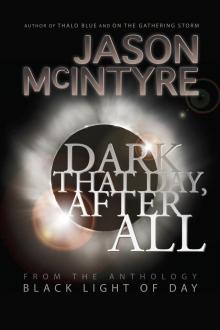 Dark That Day, After All
Dark That Day, After All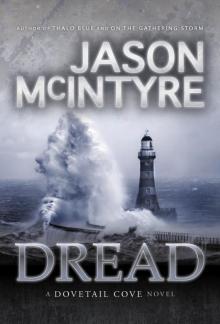 Dread
Dread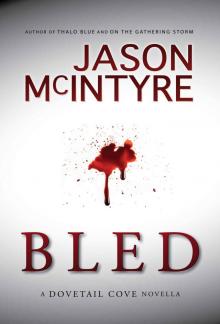 Bled
Bled Instead
Instead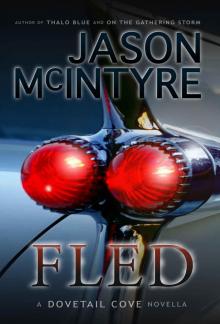 Fled
Fled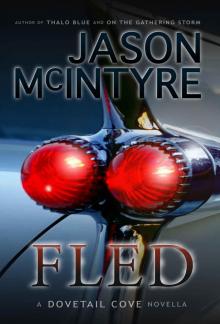 Fled (Dovetail Cove, 1973) (Dovetail Cove Series)
Fled (Dovetail Cove, 1973) (Dovetail Cove Series)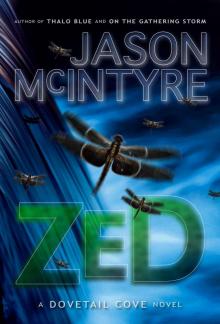 Zed
Zed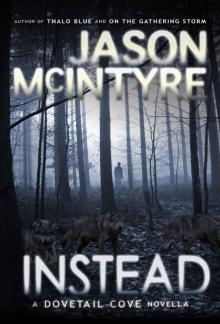 Instead (Dovetail Cove, 1979) (Dovetail Cove Series)
Instead (Dovetail Cove, 1979) (Dovetail Cove Series)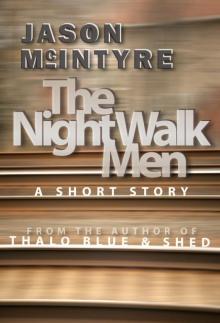 The Night Walk Men
The Night Walk Men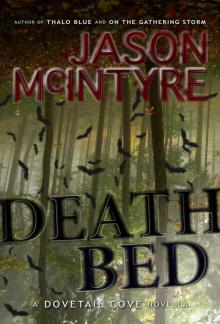 Deathbed (Dovetail Cove, 1971) (Dovetail Cove Series)
Deathbed (Dovetail Cove, 1971) (Dovetail Cove Series)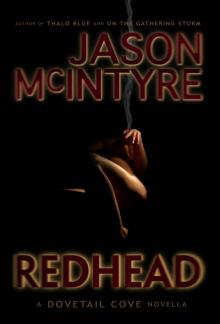 Redhead (Dovetail Cove, 1974) (Dovetail Cove Series)
Redhead (Dovetail Cove, 1974) (Dovetail Cove Series)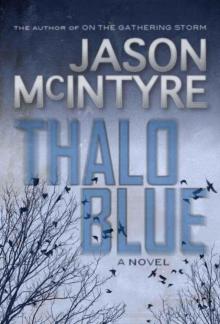 Thalo Blue
Thalo Blue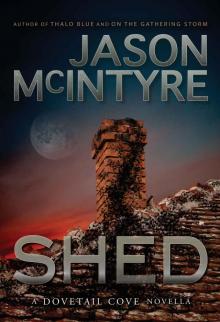 Shed
Shed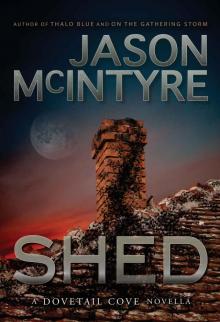 Shed (Dovetail Cove, 1977) (Dovetail Cove Series)
Shed (Dovetail Cove, 1977) (Dovetail Cove Series)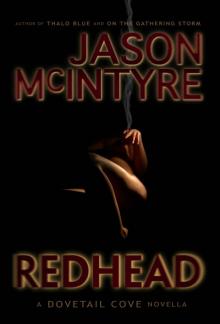 Redhead
Redhead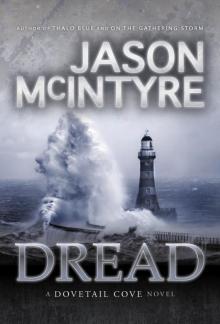 Dread (Dovetail Cove, 1978) (Dovetail Cove Series)
Dread (Dovetail Cove, 1978) (Dovetail Cove Series)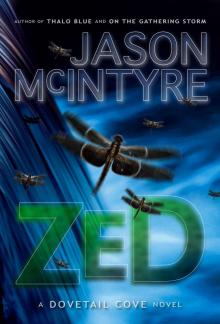 Zed (Dovetail Cove, 1975) (Dovetail Cove Series)
Zed (Dovetail Cove, 1975) (Dovetail Cove Series)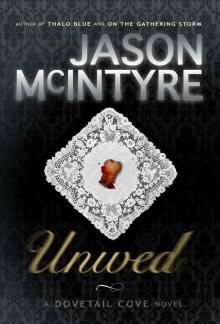 Unwed (Dovetail Cove, 1976) (Dovetail Cove Series)
Unwed (Dovetail Cove, 1976) (Dovetail Cove Series)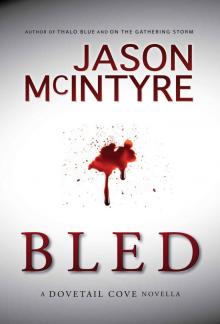 Bled (Dovetail Cove, 1972) (Dovetail Cove Series)
Bled (Dovetail Cove, 1972) (Dovetail Cove Series)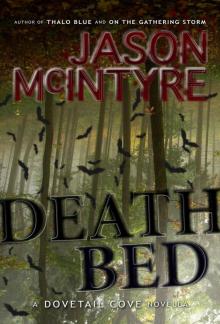 Deathbed
Deathbed